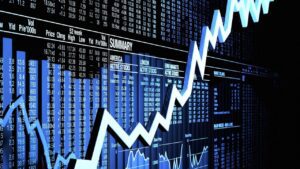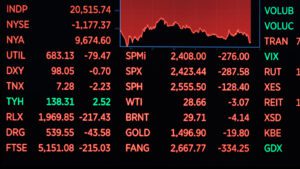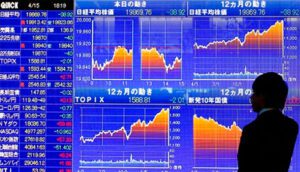
Stock indices of the largest countries in the Asia-Pacific region (APR) do not show a single dynamics during trading on Tuesday.
The Japanese Nikkei 225 rose by 0.02% by 08:35 Moscow time.
Consumer spending in Japan rose 3.4% year-on-year in July, official statistics show. Analysts on average predicted an increase of 4.2%.
The growth leaders among the components of the index are shares of the chemical Unitika Ltd., which add 7.5%, the leaders of the fall are the papers of the electricity distribution company Tokyo Electric Power Co. Holdings Inc. (-four%).
Asia’s largest clothing retailer Fast Retailing is up 0.1%, automaker Nissan Motor Co. – decrease by 0.75%.
The Chinese Shanghai Composite index added 1.11% by 08:40 Moscow time, while the Hong Kong Hang Seng fell by 0.16%.
The People’s Bank of China (PBOC, the country’s central bank) intends to lower the required reserve ratio (RRR) for banks by 200 points, to 6%, starting from September 15, the regulator said. The decision was made against the backdrop of the fall of the Chinese yuan to its lowest value in two years, writes Trading Economics.
The leaders of the decline are the shares of car dealer Zhongsheng Group Holdings Ltd. (-4.9%), Alibaba Health Information Technology Ltd., which provides services for the collection and use of medical data, (-4.3%) and one of the largest bottled water producers in China, Nongfu Spring Co. Ltd. (-2.6%).
The South Korean Kospi index rose by 0.12% by 08:35 Moscow time.
Shares of one of the world’s largest manufacturers of chips and consumer electronics Samsung Electronics Co. fell by 0.18%, while automaker Hyundai Motor – rose by 0.25%.
The Australian S&P/ASX 200 is down 0.36% since the market opened.
The Reserve Bank of Australia (RBA) raised its key rate by 50 basis points for the fourth time in a row amid efforts to fight inflation, while warning of its readiness to continue tightening monetary policy.
The key rate was raised on Tuesday to 2.35% from 1.85%. Since May, the regulator has increased it by a total of 225 basis points – the highest rate of monetary tightening in almost 30 years, writes MarketWatch.
Consumer confidence in Australia rose 1.3% last week, hitting its highest since early June, according to ANZ Bank’s weekly survey.
Meanwhile, Australia’s current account surplus widened to A$18.3 billion in the second quarter from A$2.8 billion in the same period a year earlier, official statistics showed.
The market value of the world’s largest mining companies BHP and Rio Tinto decreased by 1% and 1.1%, respectively. Rio Tinto has entered into a binding agreement with Turquoise Hill Resources Ltd. about the acquisition of the remaining shares of the copper producer, which it does not already own, Rio Tinto said in a statement.

The exception is Hong Kong’s Hang Seng, which fell more than 1.5% by 8:31 AM ET.
The decline leaders are shares of automotive companies Geely and BYD, which lost 6.3% and 5.3%, respectively. On Friday it became known that the investment company of American billionaire Warren Buffett Berkshire Hathaway continued to reduce its stake in BYD and sold the second stake in the automaker in two weeks.
In addition, papers of online retailers JD.com Inc. are getting cheaper. (-3.4%) and Alibaba (-2.7%), consumer electronics manufacturer Xiaomi Corp. (-2.9%), Internet giant Tencent Holdings Ltd. (-3.1%).
Following the increase in oil prices, stock prices of representatives of this industry are growing: PetroChina Co. (+1.9%), China Petroleum & Chemical Corp. (+1.7%) and CNOOC (+1.5%).
The Chinese authorities are introducing restrictive measures and continue mass testing for COVID-19 among more than 20 million residents of the city of Chengdu, the administrative center of Sichuan province. It is the sixth most populous city in the country. In addition, measures to restrict movement were taken in Shenzhen.
Business activity in China’s industrial sector rose for the third month in a row in August, according to the Purchasing Managers’ Index (PMI) calculated by Caixin Media and S&P Global.
While the PMI slipped to 55 from a 15-month high of 55.5 in July, it remained above the 50-point mark, which indicates an increase in activity in the sector. At the same time, analysts expected the index to fall to an average of 51 points, according to Trading Economics.
Consolidated PMI last month decreased to 53 points from 54 points in July.
The Chinese Shanghai Composite index is almost at the level of previous trading, as well as the Japanese Nikkei 225.
The price of securities of the Japanese oil company Inpex is growing by 0.7%, non-ferrous metals producer Sumitomo Metal Mining Co. – by 1.9%, investment technology company Softbank Group – by 0.15%.
Asia’s largest clothing retailer Fast Retailing is down 1%, automaker Nissan Motor Co. – by 1.6%.
The South Korean index Kospi by 08:20 Moscow time fell by 0.3%.
Shares of one of the world’s largest manufacturers of chips and consumer electronics Samsung Electronics Co. fell by 1%, while automaker Hyundai Motor – rose by 1.8%.
The Australian indicator S&P/ASX 200 added 0.2% since the market opened.
The market value of the world’s largest mining companies BHP and Rio Tinto rose by 2.6% and 1.8%, respectively.
Retail sales in Australia rose 1.3% month-on-month in July to a record A$34.67 billion, final data show. This is the biggest increase since March.

Hong Kong’s Hang Seng index fell 0.6% by 8:10 qoq, while China’s Shanghai Composite rose 0.3%.
Among the leaders in the fall of quotations on the Hong Kong Stock Exchange are shares of real estate developers Country Garden Holdings Co. Ltd. (-4%) and China Resources Land Ltd. (-3.7%), manufacturer of sports goods Anta Sports Products Ltd. (-2.3%) and PC maker Lenovo Group Ltd. (-2.2%).
Shares of Chinese electric vehicle manufacturers are also actively declining, including NIO Inc. become cheaper by 2% and XPeng Inc. – by 4.1%. Companies reported an increase in deliveries of electric cars in August, but the pace of increase fell short of investors’ expectations, analysts at Citi said.
The value of the Japanese index Nikkei 225 to 8:20 q decreased by 0.02%.
Among the components of the indicator, shares of NEXON Co., a mobile game developer, are depreciating most actively. Ltd. (-3.6%), machine-building Mitsubishi Heavy Industries Ltd. (-2.4%) and oil Idemitsu Kosan Co. Ltd. (-2%).
Meanwhile, Japanese retailers Isetan Mitsukoshi Holdings Ltd. are the leaders of growth. (+2.7%), Seven & I Holdings Co. Ltd. (+2.5%) and J. Front Retailing Co. Ltd. (+2.4%).
The South Korean index Kospi rose by 0.3% by 8:25 a.m.
Shares of automaker Kia Corp. rise in price by 1.2%, one of the world’s largest manufacturers of chips and consumer electronics Samsung Electronics Co. cheaper by 0.9%.
Consumer prices in South Korea in August rose by 5.7% in annual terms, showed data from the statistical office of the country. Inflation slowed down from a 24-year high of 6.3% in July and came in below analysts’ forecast of 6.1%, according to Trading Economics.
The slowdown in the growth of consumer prices in the country was ensured by a slowdown in the rise in prices for food and energy resources, according to the report of the statistical office.
On a monthly basis, consumer prices fell 0.1% last month after rising 0.5% in July.
The Australian S&P/ASX 200 fell 0.1%.
The market value of the world’s largest mining companies BHP and Rio Tinto falls by 2% and 2.6% respectively.

Stock indices of the largest countries in the Asia-Pacific region are mainly falling during trading on Wednesday following the decline in the US stock market, as well as due to weak statistical data from China.
The Purchasing Managers’ Index (PMI) for China’s manufacturing industry rose to 49.4 in August from 49 in the previous month, the country’s National Bureau of Statistics said.
A PMI value above 50 points indicates an increase in activity in the sector, below – its weakening. The indicator is below this level for the second month. Meanwhile, analysts had expected a less significant increase on average – to 49.2 points, according to the results of polls by The Wall Street Journal and Trading Economics.
PMI services and construction fell this month to 52.6 points from 53.8 points in July. Consolidated PMI fell to 51.7 points from 52.5 points.
China’s Shanghai Composite index fell 0.2% by 8:43 qoq, while Hong Kong’s Hang Seng added 0.5%.
Leading gainers on the Hong Kong Stock Exchange include shares of restaurant chain owner Haidilao International Holding Ltd. (+6.6%), game developer Netease Inc. (+3.9%), Internet company Meituan (+4.2%), sporting goods manufacturer Li Ning Co. (+4%).
Meanwhile, shares of automotive companies BYD (-7.5%) and Geely (-1.2%), oil PetroChina (-1.3%) fell in price.
Country Garden Holdings Co. share price fell by 4.8%. China’s largest real estate developer by sales in the first half of the year reduced its net profit by 96%, which was the largest decline since the company’s entry into the Hong Kong stock exchange in 2007.
The Japanese Nikkei 225 fell 0.5% by 8:38 a.m.
Oil company Inpex is down 3.5%, metals producers Pacific Metals Co. and Japan Steel Works – respectively by 2.3% and 2.4%.
In addition, shares of investment and technology company Softbank Group (-0.3%), consumer electronics manufacturer Sony (-1.9%), Asia’s largest clothing retailer Fast Retailing (-0.9%) are depreciating.
Industrial production in Japan in July decreased by 1.8% compared to the same month last year, according to preliminary data. The indicator showed a decline for the fifth month in a row.
The number of homes started in the country last month fell 5.4% year on year. The index has been declining for the third month. Analysts had expected a 4.1% contraction.
Meanwhile, Japan’s consumer confidence index rose to a three-month high in August at 32.5 points. In July, the indicator was at a minimum for 18 months – 30.2 points. The average forecast of experts assumed a rise of only 31 points.
Retail sales in the country in July increased by 2.4% compared to the same month last year. Thus, they rose for the fifth month in a row. Analysts, on average, expected a less significant increase of 1.9%, according to Trading Economics.
The South Korean index Kospi rose by 0.7% by 8:36 a.m.
Shares of one of the world’s largest manufacturers of chips and consumer electronics Samsung Electronics Co. rose in price by 1.4%, automaker Hyundai Motor – by 0.3%.
The Australian S&P/ASX 200 fell 0.3%.
The market value of the world’s largest mining companies BHP and Rio Tinto fell by 2.8% and 0.9%, respectively.